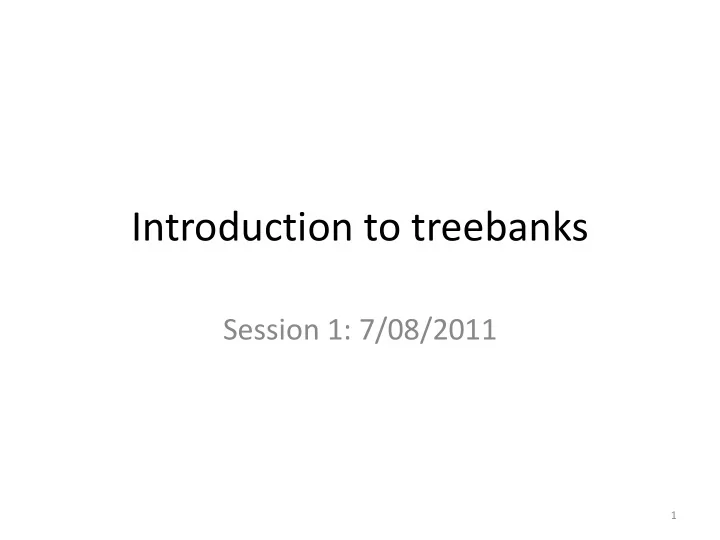

Introduction to treebanks Session 1: 7/08/2011 1
Outline • Types of treebanks – (Syntactic) Treebank – PropBank – Discourse Treebank • The English Penn Treebank • Why do we need treebanks? • Hw1 2
(Syntactic) Treebank • Sentences annotated with syntactic structure (dependency structure or phrase structure) • 1960s: Brown Corpus • Early 1990s: The English Penn Treebank • Late 1990s: Prague Dependency Treebank • 1990s – now: Arabic, Chinese, Dutch, Finnish, French, German, Greek, Hebrew, Hindi, Hungarian, Icelandic, Italian, Japanese, Korean, Latin, Norwegian, Polish, Spanish, Turkish, etc. 3
An example • John loves Mary . S NP VP ./. John/NNP loves/VBP NP Mary/NNP • (S (NP (NNP John)) (VP (VBP loves) loves/VBP (NP (NNP Mary))) ./. John/NNP Mary/NNP (. .)) 4
PropBank • Sentences annotated with predicate argument structure • Ex: John loves Mary – “loves” is the predicate – “John” is Arg0 (“Agent”) – “Mary” is Arg1 (“Theme”) • 2000s: The English PropBank, followed by the PropBanks for Chinese, Arabic, Hindi/Urdu, etc. 5
Discourse Treebank • 2006-2008: The English Discourse Treebank • The city’s Campaign Finance Board has refused to pay Mr. Dinkins $95,142 in matching funds because his campaign records are incomplete. • Motorola is fighting back against junk mail. So much of the stuff poured into its Austin, Texas, offices that its mail rooms there simply stopped delivering it. Implicit = so Now, thousands of mailers, catalogs and sales pitches go straight into the trash. 6
Multi-representational, multi-layered treebank • 2010-: Multi-representational, multi-layer Treebank for Hindi/Urdu • The treebank includes both PS, DS, and PB. S loves/VBP NP VP ./. ./. John/NNP Mary/NNP John/NNP loves/VBP NP “loves” is predicate. “John” is Arg0. Mary/NNP “Mary” is Arg1. 7
Outline • Types of treebanks • The English Penn Treebank • Why do we need treebanks? • Hw1 8
The English Penn Treebank (PTB) • Developed at UPenn in early 1990s • Most commonly used treebank in the CL field • Data: – WSJ: 1-million words from 1987 to 1989 – Others: Brown Corpus, ATIS, etc. • Release: – 1992: version 1 – 1995: version 2 – 1999: version 3 9
An example 10
The PTB Tagset • Syntactic labels: e.g., NP, VP • Function tags: e.g., -SBJ, -LOC • Empty categories (ECs): e.g., *T* (for A-bar movement) • Sub-categories for ECs: e.g., 0 (zero complementizers), NP* (PRO, A-movement) 11
Passive 12
Clausal Complementation 13
Raising 14
Wh-Relative Clauses 15
Contact Relatives 16
Indirect Questions 17
Punctuation 18
FinancialSpeak 19
Lists 1 20
Lists 2 21
Outline • Types of treebanks • The English Penn Treebank • Why do we need treebanks? • Hw1 22
Why do we need treebanks? • Computational Linguistics: (Session 6-7) – To build and evaluate NLP tools (e.g., word segmenters, part-of-speech taggers, parsers, semantic role labelers) – This leads to significant progress of the CL field • Theoretic linguistics: (Session 2 and 5-6) – Annotation guidelines are like a grammar book, with more detail and coverage – As a discovery tool – One can test linguistic theories and collect statistics by searching treebanks. 23
CL example: Parsing S => NP VP . Input: John loves Mary . NP => NNP VP => VBP NP NNP => John Output: S NNP => Mary NP VP ./. VBP => loves John/NNP loves/VBP NP . => . Mary/NNP 24
Ambiguity PP attachment: John bought the book in the store S => NP VP NP => PN S VP => V NP VP VP => VP PP NP NP => NP PP VP PP => P NP PP John/NNP bought/VBP NP S in the store the book VP NP bought/VBP NP John/NNP NP PP 25 in the store the book
Labeled f-score sys output: gold standard: S S VP VP NP NP VP NP PP bought/VBP John/NNP John/NNP NP 2 NP PP bought/VBP 1 in the store 1 2 in the store the book the book 5,6,7 (1, 7, S) (1, 7, S) 3,4 5,6,7 3,4 (1, 1, NP) (1, 1, NP) (2, 7, VP) (2, 7, VP) (3, 7, NP) (2, 4, VP) (3, 4, NP) (3, 4, NP) (5, 7, PP) (5, 7, PP) (6, 7, NP) (6, 7, NP) Prec=6/7, recall=6/7, f-score=6/7 26
Parsing evaluation • Use the English Penn Treebank – Section 2-18 for training – Section 23 for final testing – Section 0-1, 22, and 24 for development • Evaluation: – precision, recall, f-score – Best f-score: around 91% 27
Outline • Types of treebanks • The English Penn Treebank • Why do we need treebanks? • Hw1 28
Hw1: required part • Required reading: Chapters 1 and 2 of the PTB guidelines • Assignment: – pick a specific phenomenon handled by the PTB, – discuss the PTB treatment of this phenomenon, and – explain whether you concur with the treatment or not. If you do not, outline how you would have represented it differently. 29
Recommend
More recommend